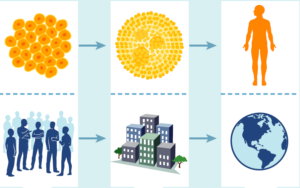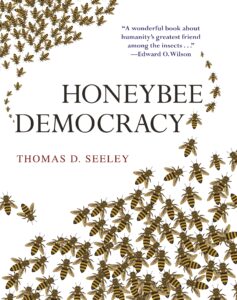Democracy
For most part of our evolutionary history, we humans have been living in small groups, with no more than a few hundred people. Any life in groups brings with it the potential for conflict and the challenge of how to distribute resources or how to make decisions. We have evolved social behaviors that allow us to regulate social life in such small groups, including social emotions, social preferences, moral intuitions such as a sense of fairness and a sense of autonomy, and a so-called norm-psychology – a tendency to learn and imitate the behaviors of the people around us, considering these behaviors as “normal” and being angered if someone behaves in a way that doesn’t follow the group’s social norms.
Today’s hunter gatherers give us some clues about the social organization that our species lived in throughout most of our history. Hunter-gatherers tend to live in egalitarian groups, meaning that there is no strong hierarchy and an equal distribution of resources. Attempts by individuals to dominate the group or hord resources are discouraged and punished by everyone else in the group.
However, with agriculture, division of labor, the first cities, our group sizes started to grow, from a few thousand to many thousands and finally millions of people. How can life in such groups be regulated? It seems that with this rather rapid increase in group sizes, the levelling mechanisms that worked well in small hunter-gatherer groups did not work so well anymore, and with increasing group size came an inequality in power and wealth.
Democracy is a way of social organization that aims to prevent such unequal distribution and abuse of power by one or a few individuals over all the others. The word democracy comes from the greek demos = people, and kratia = power.
We often hear that democracy as a way of social organization was invented by the Greeks about 500 BC. But in a more general way, we can also find elements of it in the egalitarian life of hunter-gatherers – after all, in their social organization, it is also the whole group who holds the power and makes decisions.
In an even more general way, we can also learn something about “democracy”, its importance and function for social life, from other social animals that live in large groups, such as honeybees.

Life in groups and conflict resolution
A reading text about the challenges of life in groups and how groups across biology have found ways to solve these challenges.

Honeybee Democracy
Students explore how a honeybee swarm makes a decision about their future nesting site, and explore the similarities and differences to how human groups make decisions.
The Goal 16 of Global Sustainable Development Goals is to promote peaceful and inclusive societies for sustainable development, provide access to justice for all and build effective, accountable and inclusive institutions at all levels.
By the way, “institutions” are not just buildings and public institutions, but also formal and informal rules that regulate life in a group. Even social norms or traditions are therefore often included when scientists talk about “institutions”.
Why do we humans care about living in a democratic social system?(think, for example, about our dependence on group life in evolutionary history, and the role of our moral intuitions)
Will all countries be democracies in the future?
How can we ensure that all people will live in political regimes that are fair and inclusive?
There are now more countries in the world that are democracies compared to other governance systems.
Will this trend continue such that in the future, all countries will be democracies?
In fact, in recent years, the proportion of democratic systems has now levelled of or even declined again.
How do you think the cultural group trait “democracy” spreads in the world? What might be the role of education, cooperation between countries, information sharing through the internet, or severe abuse of power by autocratic leaders and rising inequality in a country?
What factors can have an influence on whether a country becomes a democracy?
Scientists are trying to understand what factors have an influence on whether a country becomes a democracy.
It is difficult for scientists to disentangle what causes what in a complex system such as a society, because there are so many factors interacting with each other. Nonetheless, there is some evidence that the more education people had in a country, the more likely it is that it will become a democracy. Furthermore, increasing the education level of the female population seems to be even more important.
The reverse also seems to be true: if a country becomes democratic, the level of school enrollment tends to become higher.
What could be the possible mechanisms for this: of better education leading to democracy, and democracy leading to better education?
References
https://ourworldindata.org/democracy
https://ourworldindata.org/democracy#does-democratization-have-an-effect-on-education
http://www.freedomhouse.org / https://freedomhouse.org/report/freedom-world/freedom-world-2018
Lutz, W., Cuaresma, J. C., & Abbasi‐Shavazi, M. J. (2010). Demography, Education, and Democracy: Global Trends and the Case of Iran. Population and Development Review, 36(2), 253–281. https://doi.org/10.1111/j.1728-4457.2010.00329.x
Seeley, T. D. (2010). Honeybee Democracy. Princeton, New Jersey, USA: Princeton University Press.

